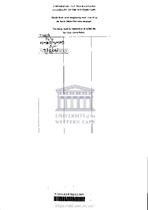Freedom of association and union security arrangements in the republic of South Africa and the Federal Republic of Germany
Abstract
In the history of labour relations, trade unions have played a major role in protecting the rights of employees and improving their working conditions. They have defended their members against exploitation by employers. They have promoted the establishment of labour
legislation, which in some countries is quite comprehensive. They represent the interests of employees in the collective bargaining process. Albertyn describes trade unions as"institutions which advance democracy, co-operation, peaceful resolution of disputes and nonviolent
negotiation (and which) are intrinsically worth preserving and protecting".' It is selfevident that a trade union needs strength to achieve these purposes. However, trade unions areweakened by the fact that it is not only union members who enjoy the benefits of their
achievements, since non-members do the same and some employees thus try to avoid the burdens of trade union membership. It is therefore understandable that trade unions attempt to decrease the numbers of these so-called "free riders". Besides the pressure that can be brought
to bear by fellow employees in the workplace, union security arrangements, such as the closed shop or the agency shop, represent another traditional method of strengthening trade unions. The free rider problem, however, is only one of many arguments used in the debate by those who support the establishment of closed shops.

